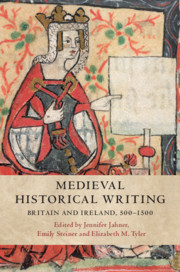Book contents
- Medieval Historical Writing
- Medieval Historical Writing
- Copyright page
- Contents
- Illustrations
- Notes on Contributors
- Abbreviations
- General Introduction
- Part I Time
- Part II Place
- Chapter 8 Mental Maps: Sense of Place in Medieval British Historical Writing
- Chapter 9 Viking Armies and their Historical Legacy across England’s North–South Divide, c.790–c.1100
- Chapter 10 Cross-Channel Networks of History Writing: The Anglo-Saxon Chronicle
- Chapter 11 Creating and Curating an Archive: Bury St Edmunds and its Anglo-Saxon Past
- Chapter 12 Historical Writing in Medieval Wales
- Chapter 13 Scotland and Anglo-Scottish Border Writing
- Chapter 14 London Histories
- Chapter 15 History at the Universities: Oxford, Cambridge, and Paris
- Part III Practice
- Part IV Genre
- Bibliography
- Index
Chapter 13 - Scotland and Anglo-Scottish Border Writing
from Part II - Place
Published online by Cambridge University Press: 19 December 2019
- Medieval Historical Writing
- Medieval Historical Writing
- Copyright page
- Contents
- Illustrations
- Notes on Contributors
- Abbreviations
- General Introduction
- Part I Time
- Part II Place
- Chapter 8 Mental Maps: Sense of Place in Medieval British Historical Writing
- Chapter 9 Viking Armies and their Historical Legacy across England’s North–South Divide, c.790–c.1100
- Chapter 10 Cross-Channel Networks of History Writing: The Anglo-Saxon Chronicle
- Chapter 11 Creating and Curating an Archive: Bury St Edmunds and its Anglo-Saxon Past
- Chapter 12 Historical Writing in Medieval Wales
- Chapter 13 Scotland and Anglo-Scottish Border Writing
- Chapter 14 London Histories
- Chapter 15 History at the Universities: Oxford, Cambridge, and Paris
- Part III Practice
- Part IV Genre
- Bibliography
- Index
Summary
This chapter surveys the major phases of historical writing in Scotland and the Anglo-Scottish borders between c.500 and c.1500. It argues that throughout the Middle Ages Scottish historical writing is progressively self-conscious in its awareness of the uses of historiography to speak to issues contemporary to the historical texts, rather than the events that they narrate. At the same time, Scottish writers are deeply aware of the need to preserve the past in historical record as a way of fostering commonality among readers assumed to identify as Scottish. As such, the texts considered here show a persistent concern with matters of lineage, identity and origin, a concern that develops and is shaped by political events. As a result, these texts are seen to negotiate geographic, linguistic and cultural borders in the collection and production of historical record and narrative.
- Type
- Chapter
- Information
- Medieval Historical WritingBritain and Ireland, 500–1500, pp. 225 - 243Publisher: Cambridge University PressPrint publication year: 2019
- 1
- Cited by

